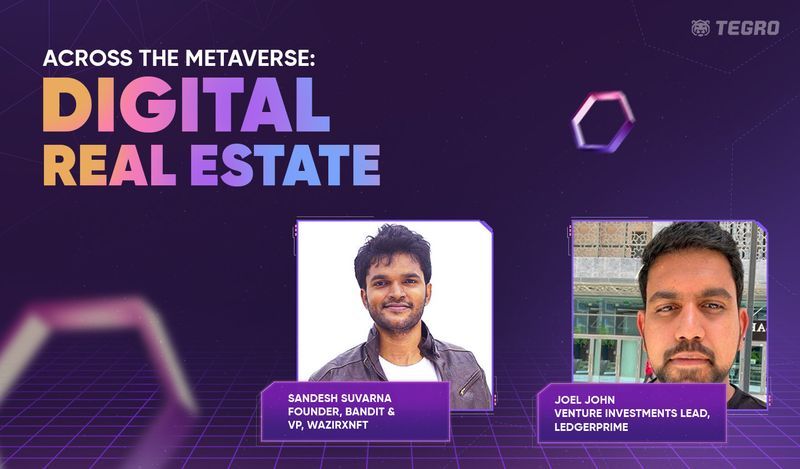gm
In this conversation, Tegro co-founder Siddharth Menon discusses the metaverse with WazirX VP Sandesh Suvarna and Head of Venture Investments at Ledger Prime, Joel John.
Apart from leading India’s top crypto exchange WazirX as a VP, Sandesh is also building Bandit, the first NFT marketplace in the country. Ledger Prime is a systematic investment firm that has backed projects like the Graph, Asteria, Defi Dollar, and many more.
Metaverse, What’s That?
- Metaverse is actually not a new concept—computer scientists have been creating cyberspaces for decades now. Platforms like Facebook have just created platforms that allow people to access these digital spaces.
- Humans have basically abstracted parts of their identity with avatars, emojis, and other digital representations that are native to these virtual platforms.
- A huge misconception that people have about the metaverse is that it’s synonymous with virtual land. The metaverse is not just a place or a medium, but a moment in time when people start spending more of their lives in a virtual world. When we reach this moment in time, it’s possible that virtual assets can become more valuable than physical ones.
- People don’t realize that when they’re playing games like Fortnite, PUBG, and World of Warcraft, they’re basically spending time inside the metaverse. People became accustomed to spending more time in virtual environments as a result of COVID 19.
- Another possible definition of the metaverse is the replication of our physical universe into a digital realm.
- It appears that the creation of a metaverse is inevitable just by looking at the technological development of humans. Block by block, we’re building every piece necessary, ranging from hardware to software, that will help us build a virtual world.
Virtual Assets and Property
- Virtual land essentially gains or loses its value based on the same factors as a physical piece of land does, i.e. how much people are willing to pay for it. For example, a person would have to pay a premium to buy a villa next to a property owned by Snoop Dogg. The same logic would apply if the individual wanted to buy a piece of virtual land next to Snoop Dogg.
- Teenagers who spend the majority of their time in virtual reality will most likely invest more time, effort, and money into their virtual world appearance than they would in real life. This shouldn't come as a surprise, as it’s human nature to present our best selves in our social environments.
- Brands like Adidas, JPMorgan, and Samsung are buying land inside the metaverse on platforms like Sandbox to create novel virtual experiences for their consumers.
- Due to the rising cost of real-physical land, younger people are flocking to digital assets like virtual land. However, at this point in time, buying digital land is not for the retail crowd. Right now, the kinds of people who are able to buy virtual land are capable of building something on it, marketing it, and adding value to it.
- Virtual land is usually denominated in cryptocurrencies like ETH or the US dollar. In the recent market downturn, the price of virtual land has stumbled a lot in dollar terms, but it's relatively stable when denominated in ETH.
Building Better Metaverses
- Last year, the Ethereum-based metaverse platform Decentraland generated a lot of hype, but now it only has 1000 concurrent users. The value of virtual land is subject to the same factors that give a physical property its worth. Game Theory in the context of virtual land suggests that, if a property is held by uninitiated squatters, it’s unlikely to increase in economic value. However, given enough traction and resources, even barren land can be turned into a metropolis. A real-world example of this phenomenon would be Singapore.
- Historically, we have seen a few physical locations disproportionately outperform other regions. One of the reasons behind the success of areas like Austin, Bangalore, Mumbai, Singapore, and Dubai is that a lot of talented, skilled people migrate to these regions and generate economic value. The same dynamic will likely be seen in the case of the metaverse, wherein people that share niche skillsets will move into groups and develop virtual properties.
Fun Fact
The term 'metaverse' was coined by famous sci-fi author Neal Stephenson in his best-selling novel Snow Crash in the 1990s.
P.S. We host equally insightful Twitter Spaces every week. Follow us on Twitter and sign up for our weekly newsletter to stay in the loop.


